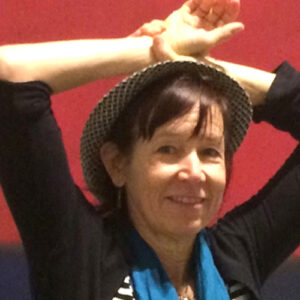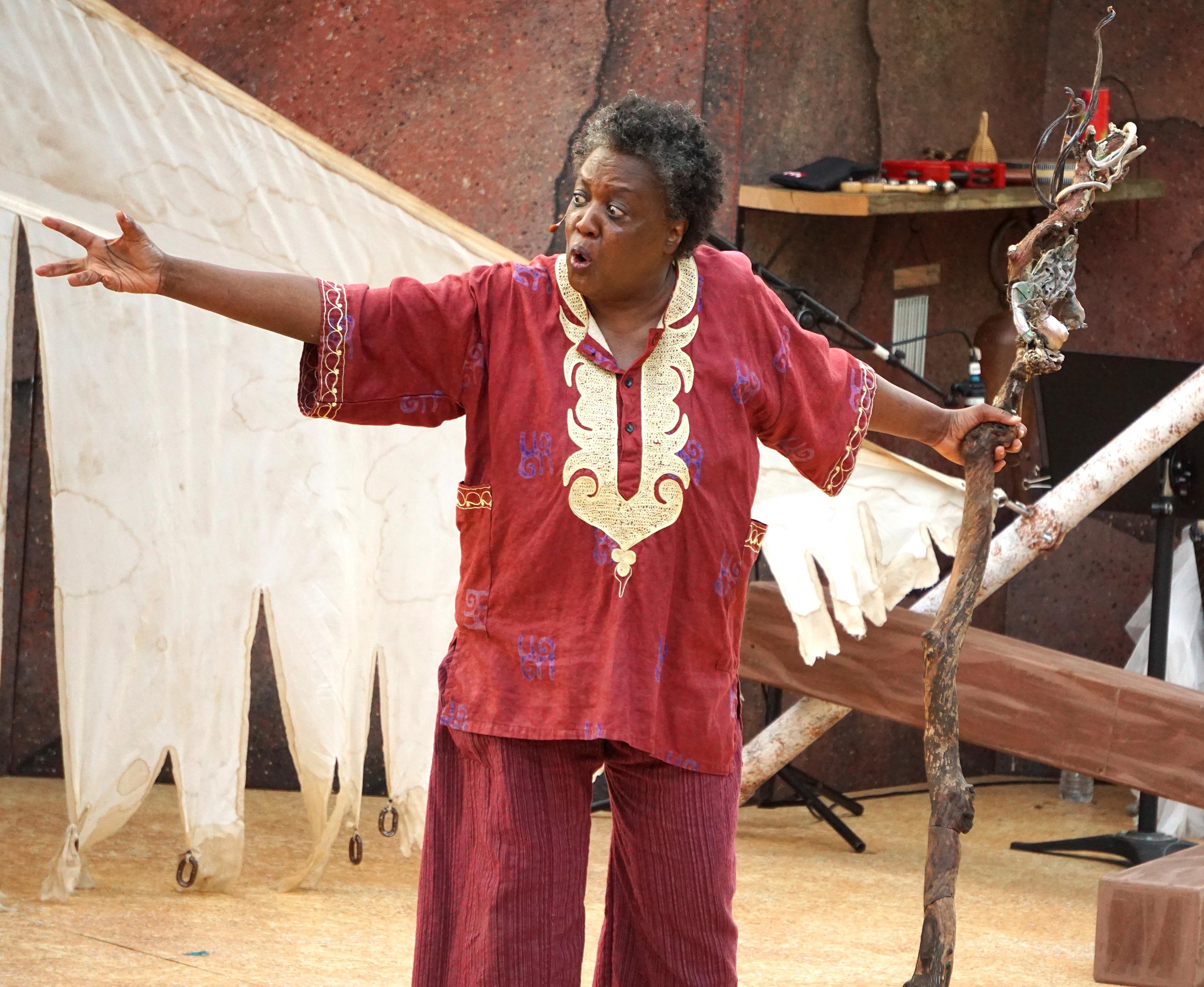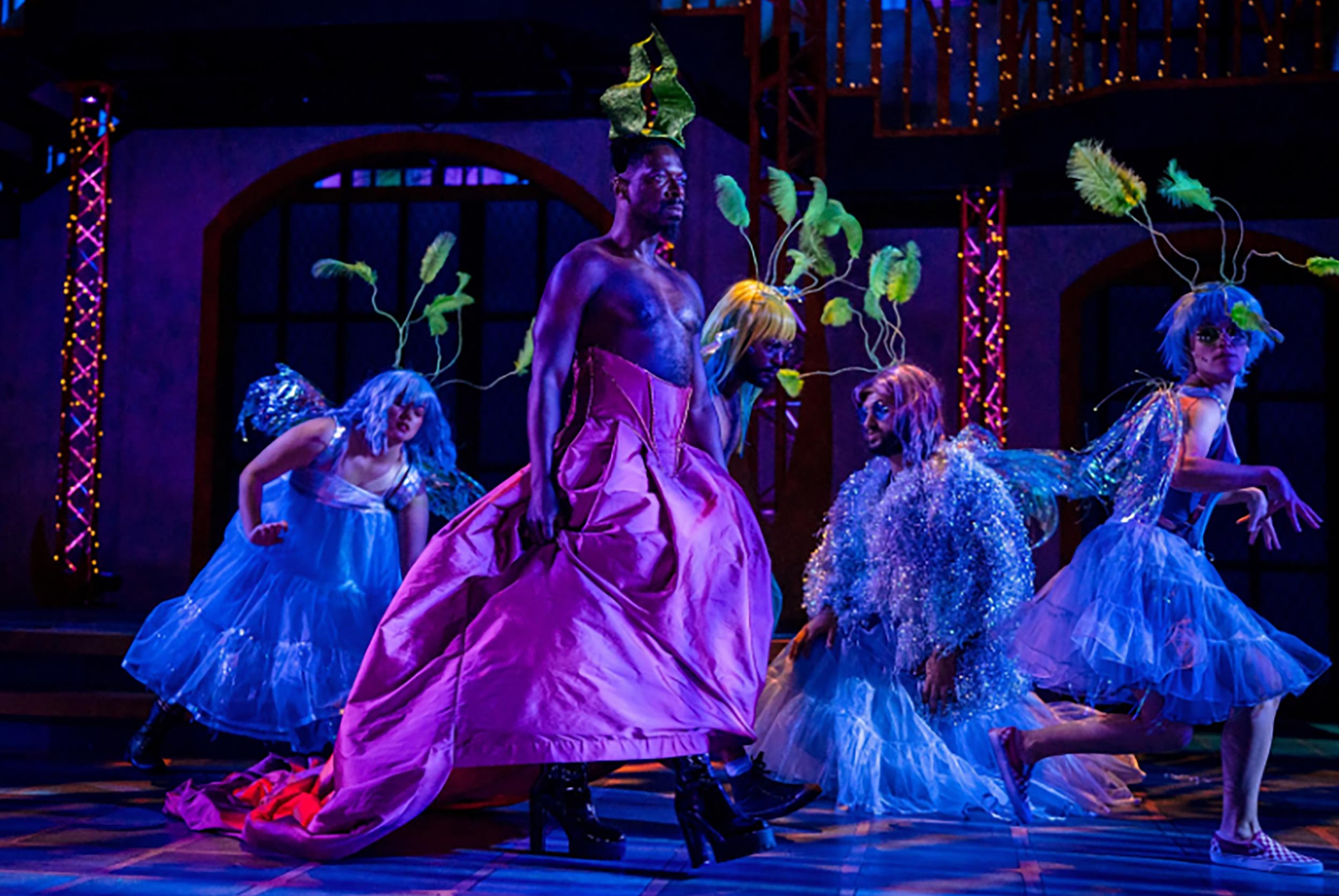
Interview with The Tempest director Rotimi Agbabiaka
By Octavia Washington
August 13, 2024

Edris Cooper-Anifowoshe* as Prospero in SF Shakes’s 2024 Free Shakespeare in the Park production of The Tempest.
* Member Actors’ Equity Association
Photo by Neal Ormond.
It’s difficult to surmise Rotimi Agbabiaka’s interdisciplinary career — the many tempests he’s traversed, before getting ready to direct San Francisco Shakespeare Festival’s version of THE TEMPEST this summer, joined by Assistant Director and Dramaturg Ely Sonny Orquiza. I start by watching MANIFESTO, a film based on a solo show written by Rotimi. (Which is still available to stream on YouTube and was directed by Edris Cooper-Anifowoshe, aka SF Shakes’ Prospero!) MANIFESTO is a comedy-drag-music-dance extravaganza, asking what do artists need to survive? Perhaps one place to look for answers is Rotimi’s resume. Rotimi Agbabiaka is an actor, writer, director, theater journalist, and teacher at Stanford University. Similarly to Prospero’s books and robes, these many skills provided Rotimi the tools needed to create a show filled with (in addition to fart jokes and goddesses decked in Pride attire) humor, play, and forgiveness. Across Zoom bubbles, we discuss their voyage, from English major to drag to Shakespare and back around again.
INTERVIEWER
I wanted to start with MANIFESTO. Edris [Cooper-Anifowoshe, playing Prospero in SF Shakes’ THE TEMPEST] sent me the link. I know you’ve worked with Edris a bunch of times and I saw Kevin [Clarke, playing Ariel/Gonzalo in THE TEMPEST] pop up on the video. I wonder what does it offer you to work with the same people over and over again?
RA
The reason why I work with them over and over again is because I love working with them. It’s always fun to find your people. They bring a certain kind of playfulness and creativity. And a certain sensibility that we share as theater makers. When you work with people like [Edris and Kevin] over and over again, it does feel like you’re building a company of sorts, even if it’s not an official company.
And in the case of Edris and I, we have our own theater company, Black Artists Contemporary Cultural Experience, and Kevin has been a collaborator with us in many productions with that company and in other venues. [Working with them] feels like you have a community, which is nice to have in this profession where you’re often bouncing from project to project and it can sometimes feel like you’re floating by yourself.
INTERVIEWER
You went to University of Texas at Austin, right?
RA
I did, yes.
INTERVIEWER
Do you feel like it’s just in the Bay that you have this community of people to always draw upon? Is it something you’ve cultivated here? Is it special to here?
RA
I’ve lived in the bay for about 14 years now. I moved here right after graduate school in Illinois. My professional life as an actor has been here in the Bay Area. I’ve always been mostly here but I’ve been making theater since high school.
In high school and in college, I had some really formative experiences and connections. So those people are still part of my theater community. [In college] I participated in this program called Shakespeare at Winedale, which happens in the summer. About 16 to 20 students go to [a historic] center in the Hill country in Texas and perform three Shakespeare plays in a 19th century barn that’s been converted into a theater. Over the course of the summer, we do three plays, live in dorms together, and make our own costumes.
It’s one of the experiences that made me really want to be a professional actor and grow to love Shakespeare, to understand him, to all the possibilities of the language.
I also have community members, in Washington DC, New York, New Haven, Bulgaria, Russia, etc. I’ve been fortunate to be able to keep building connections with artists in the Bay Area, but also beyond.
INTERVIEWER
Had you done Shakespeare before the program?
RA
We’d read some plays in English class. When I was a child, we had these abridged children’s versions of Shakespeare that were like synopses. And then middle school, we read some Shakespeare. Romeo and Juliet. I remember being fascinated by it, but not fully understanding it.
The wonderful thing about Shakespeare at Winedale was the way it taught Shakespeare. [The program] was [run by] the English department but instruction was [taught] through performance. That really opened my eyes because the plays were not meant to be read. They were meant to be performed. They weren’t even written down in a collection in Shakespeare’s time. And so it wasn’t a literary work, it was a work that was just created to be spoken. And to be heard. So in learning it through performance I was like, Oh my God, this is how it makes sense. And this is what the rhythm is doing. And this is how the rhythm of the words helps you understand what the keywords are and what the meaning is.
Once that became unlocked, it was so exciting for me to learn and to play [with Shakespeare]. Like, okay, this is something that’s mine. I can live in this world. It’s not some archaic thing that is incomprehensible.
INTERVIEWER
You’re also a drag performer?
RA
I’m in semi-retirement, but I have done [drag] and probably will do it again.
INTERVIEWER
I was just curious cause you said you were making costumes in the Shakespeare [at Winedale] program. Are there any ways in which your drag career interacts with Shakespeare?
RA
Absolutely. I haven’t necessarily done a Shakespeare [drag] number, which now I’m wondering: why haven’t I done that? But of course thinking about the history of Shakespeare, the roles were initially played by only male identified actors.
There’s always gender subversion imbued, not just because of that history, but because in so many of the plays, there’s so much playing with gender: women dressing up as men, or in [the original production], it’s a man playing a woman, playing a man.
Even just the size of the feelings. The expressions that [characters] make I consider very akin to the size of drag performance. The heightened version of reality or femininity or whatever persona is being inhabited by the drag performer. I certainly think, in the other drag that I’ve done and continue to do, that Shakespeare has been an influence. Teaching me how to hold a stage and go somewhere over the top.
In 2022, I played Oberon in A Midsummer Night’s Dream at the Folger Shakespeare Center in Washington D.C. That was a period where my drag performance intersected beautifully with Shakespeare as my Oberon was clad in platform high heels and a giant pink skirt with a massive train. In that production, Oberon was the one who got love juice in his eyes and fell in love with Bottom. In performing that role, I used mannerisms honed in my drag performance and was very grateful that drag had taught me how to walk in 5-inch heels. It was a joy to lean into the queerness that Shakespeare embedded in the role of the “King of the Fairies.”

Rotimi Agbabiaka as Oberon in Folger Shakespeare Center’s 2022 production of A Midsummer Night’s Dream
Photo by Brittany Diliberto.
INTERVIEWER
How is your Tempest in dialogue or offering, challenging, bickering with other versions that you’ve seen? Are there any productions that have struck you?
RA
Absolutely. I’ve seen quite a few productions of Tempest in person, and I watched a few more, just in preparing for this production, online or streaming or recordings of them. Almost 20 years ago, I saw a production at Shakespeare’s Globe in London, starring Mark Rylance as Prospero. It was this version where there were just three actors in the show. There were also three dancers that [acted as] sprites who supported the performance, but three [main] actors played all the characters.
[The production contained] interesting parallels. The same actor who played Prospero played Stefano and I think Alonso. The actor who played Miranda played Ariel and Trinculo. And then the third actor played Caliban. Those three people doubled and tripled and quadrupled as all the other characters. It was a very imaginative production and it put you inside Prospero’s head. It really highlighted for me the echoes among the different groups of characters – the island characters, the courtly characters, and then the lower class or “downstairs” characters, and how they all reflect a lot of the same themes of power and hunger for power and then betrayal and forgiveness or restoration after the betrayal.
One of the things that really stood out about another [Shakespeare Globe’s] production was the fun and irreverence of it. Prospero was not this magisterial [figure], he wasn’t in these big robes. He had on a yellow speedo and he kind of just looked like a crazy guy who had been on an island for 12 years. There was something very cartoonish about, it reminded me, oh yeah, there’s so much humor in this play.
I remember that when Miranda said, “oh, brave new world that has such people in it,” I was in tears and I feel like everyone in the theater was in tears because the [fun and irreverence of the] whole production led up to this realization. To moments where you’re so full of love for people.
Seeing that production made me really realize, oh, this is a journey from division and resentment and a kind of insanity, as personified by that Prospero, right? Insanity that comes when you focus on the evil that’s been done to you and let that be what fills your imagination and your mind.
When the chance came to propose this project [for SF Shakes], I thought it’d be wonderful to attempt this. How do we go from division, from loss and betrayal? Especially at such a divided time in our nation and the world at large. I would say that our production is in conversation with [Shakespeare’s Globe] production for sure, explor[ing] that theme of reconciliation and plumbing the humor, joy and playfulness in the play.
INTERVIEWER
Yeah, I definitely get that. What I like about Tempest is it’s a story of redemption, about Prospero and Alonso and Gonzalo and all those men, sort of getting a second act, as rulers and parents, which feels like an interest of yours in MANIFESTO about [getting] a second act [in your] career.
My final question. With your English major expertise, pick one Shakespeare play that has to stay, and then one Shakespeare play that has to go.
RA
If I, for some reason, was in the horrible position of having to choose only one Shakespeare play that would remain, the first one that comes to mind is King Lear, just because I love that play. I think it’s really amazing. I’ve been in it and I’ve seen productions of it that have been so moving cosmic scope. So I would say that play, although THE TEMPEST, because I’m working on that now, and it’s so alive in my mind, the possibilities of it and the simplicity of it too. So I’m definitely biased. If there was one play that I would let go, well, I’ve never read Henry VIII. I would choose that one just because I’ve never read or seen it. But I’m sure it has a lot of valuable things.
INTERVIEWER
Well, I’ve also never read it, so chop.
San Francisco Shakespeare Festival’s THE TEMPEST is running from July-September in Cupertino, Redwood City, and San Francisco. For more information on dates and times, check out the schedule on sfshakes.org and @sfshakesfest on Instagram!
Octavia Washington is a writer, playwright, critic, and fashionista who graduated from Carleton College and is currently pursuing a Dramaturgy MFA candidate at Columbia University. You can find her work online at Torch Literary Arts, The Public Theater, or check out her magazine Queer Dear on Instagram. She lives in New York and can be found shopping until dropping, probably.
RECENT POSTS